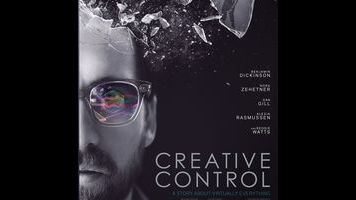The sci-fi indie Creative Control imagines the hipster future

The central metaphor of Nicholson Baker’s 1994 novel The Fermata is the Fold, the narrator’s power to freeze time, which he uses more or less exclusively to undress unsuspecting women and jerk off. It’s a crude but elastic way to depict the rapid, ceaseless workings of the erotic imagination, and one of Baker’s more memorable forays into descriptive mania and purely literary time. The Fermata comes to mind (wordplay unintended, but welcomed) a lot in Benjamin Dickinson’s sci-fi indie Creative Control, which combines a satire of corporate hipsterdom with a metaphor for personal alienation and sexual fantasy, without ever completely committing to either. Its version of the Fold is Augmenta, a next-gen augmented reality gadget that falls into the hands of an ad man (Dickinson), who uses it more or less exclusively to develop a digital facsimile of his best friend’s girlfriend (which only he can see) and jerk off.
Creative Control is set in “near-future Brooklyn,” represented through impeccable open offices and bedrooms lit with roly-poly Ikea Jonisk lamps. Dickinson’s pill-popping, carefully bearded David is an executive at an ad agency, where his biggest client is Phalinex, a smokeable anxiety medication whose long list of horrifying side effects begins with “burning toenails.” He lives with his yoga teacher girlfriend, Juliette (Nora Zehetner), but pines—at first unconsciously—for struggling fashion designer Sophie (Alexia Rasmussen), who is dating his photographer buddy Wim (Dan Gill). Dickinson and co-writer Micah Bloomberg lace everything with parodic dialogue; this is a world where “You’re establishing your brand” passes for encouragement and a woman asks, “How much do you think it costs to lease an electric car?” while her boyfriend fondles her breasts.
People say things like “Augmenta is not Main Street, it’s Bedford Avenue,” “You’ve got a boner for the newest face computer,” and, “I was wondering why we don’t hang out more, and then I realized that last year at the Christmas party, I said something to you that might have come off as racist” with admirably straight faces. Last year’s Ex Machina, with which the film shares a few superficial similarities, tackled the Brooklyn bro archetype more vividly, in the form of Oscar Isaac’s billionaire recluse character. But at least Creative Control has quantity on its side. It’s wall-to-wall with digs at an Urban Outfitter-ized professional culture where “content” has ironically come to signify emptiness, and boasts appearances from the likes of Reggie Watts, Himanshu “Heems” Suri, and Vice co-founder (and former ad agency creative director) Gavin McInnes, who gets a surprisingly substantial amount of screen time as David’s supervisor.
Dickinson is a veteran of commercials, and, like his character, directed an ad campaign starring Watts, who plays himself in Creative Control. And this isn’t the director’s first time examining Brooklynite yuppiedom through the lens of the fantastic. His debut feature, First Winter, depicted the end of the world from the perspective of a yoga retreat, whose participants are suddenly forced to fend for themselves as civilization collapses in the distance. (First Winter’s Paul Manza, a real-life yoga instructor with a Friedrich Engels beard, pops up here as Juliette’s workplace rival.) That earlier film was shot on grubby, handheld Super 16 mm with long lenses—a look that was as calculated, in certain ways, as Creative Control’s digital widescreen, in which everything is rendered in black-and-white except the Augmenta interface, which appears in color. Knowingness is the key ingredient, and that includes knowing how to sell an idea, for lack of a better term.
The style is self-conscious to a fault, rife with long takes, slow-motion shots, and snippets of classical music and A Clockwork Orange-esque synthesizer that announce the movie as Kubrick-worshipping “serious cinema,” or a parody of the same. Perhaps it’s too funny in spots to not seem like it’s in on a joke, and too indulgent for that joke to have much of a bite. Future-corporate trappings aside, the only purpose of Augmenta—which comes in the form of a pair of glasses with clear plastic frames—is to visualize the inside of David’s head. Its ability to record and re-mix reality like a sampler stands in for his imagination, and one can’t help but take issue with the way Dickinson and Bloomberg equate fantasy with estrangement, given how much of our lives passes entirely in our heads.
Compare with Spike Jonze’s Her, set in an equally (though more subtly) satirical future; it treats the romance between Joaquin Phoenix’s sad sack and Scarlett Johansson’s AI voice as poignantly real, and speculates whether it qualifies as a relationship for other reasons. Augmenta is largely extraneous to the plot of Creative Control, which mostly deals with David’s lusting for Sophie while he watches Dan repeatedly cheat on her. Take away the high-tech glasses—which, ironically, don’t alter perception so much as represent it—and what you’re left with is a meandering millennial relationship drama of indecision; like quite a few movies about commitment-phobic alter egos, it seems reluctant to commit to a point of view, but benefits from an offbeat sci-fi setting. In the end, it all comes down a cautionary tale call to “real life”—a call that the movie will heed, just as soon as it’s done with this latest scene of David pretending to fuck a polygonal figure to Vivaldi.